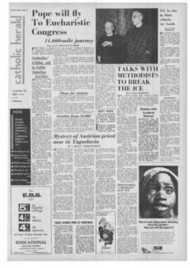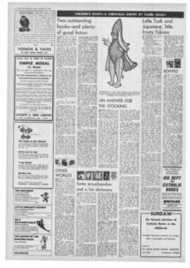Page 4, 24th November 1967
Page 4

Report an error
Noticed an error on this page?If you've noticed an error in this article please click here to report it.
Tags
Share
Related articles
Perfect Preachers For The Next Millennium
A Staff 'reporter Looks Back On A —
Churchmen Show Concern On Baptism
A View Of Unity For Arcic Ii And The Wcc
Cardinal Intervened On Fr. Mccabe
A RESPONSE FROM A DOMINICAN
ON 21st December, 1966, English Christians and Roman Catholics in particular were shocked to hear the announcement that Fr. Charles Davis had decided to leave the Roman Catholic Church. A brief statement appeared next day in , the newspapers, and an article in The Observer for 1st January 1967.
Now in a new book, A Question of Conscience, Mr. Davis gives a full acount of the reasons for his decision; he reprints the original statement but not the article, the tone of which he now seems rather to regret, though he still finds its arguments convincing.
The book may be seen as an expansion of the article, calmer and more reflective in tone and it certainly succeeds in its main purpose of making Mr. Davis's decision intelligible, and indeed of winning the reader's sympathy in a way which for many readers the article did not.
Mr. Davis's decision shocked different kinds of people. Among Catholics in particular, there were those who knew his real value and his real achievements, his work for and in The Clergy Review, his lectures and writings, and who perhaps knew him personally or had at least heard him speak.
The Vatican Council was held because of a widespread awareness that the Roman Catholic Church was not as perfect an expression of Christianity as it was meant to be by its founder, Jesus Christ. And what we are now beginning to realise in actual experience and not just In theory, is that the Church must continually change if it is to express the Christianity of n5 founder.
As a Catholic theologian, Charles Davis was one of those who did most for English-speaking Christians in helping to shape their awareness of this need for change. Inevitably he had always to live with the problem of reconciling continuity with change. This problem is especially acute for the Christian.
The real need for change is to try to show the essential Christian pattern as clearly as possible in a shape which men at any time can understand and feel at home in. This is the real meaning of the permanent need for reform in the Church and of the Church: not to change the basic pattern which Jesus Christ gave to the Church. but to make clearer to the world just what the pattern was meant to bring to men: the presence on earth of the truth, love and life of God in Jesus Christ.
It seems to me that it is just here that as Catholics we must reject Charles Davis's criticisms of the Roman Catholic Church,: in what seems to be his failure properly to distinguish between what belongs to the essential pattern of the Church and the way that this is actually embodied at any moment of history.
One could see the present life of the Church as the development and growth from-that of New Testament times. In matters of doctrine particularly, Newman in the nineteenth century provided an account of development which satisfied him that the claims of the Roman Church are sound. Yet the Roman Church itself resisted this account for many years, until more recently it has become generally accepted.
The other way of looking at the difference between the early Church and the one we have now is to see the present one as largely the corruption of the original truths and institutions. This way of looking at, it has so often been proposed by reformers who have eventually ceased to be in communion with the Roman Church that it tends to be viewed with suspicion by Catholics. And yet every reform proceeds from a sense that the light and life of the original Gospel has been obscured.
Both accounts are true up to a certain point.
What as Roman Catholics we must maintain is that the essential pattern of the Church is always completely embodied in the Roman Catholic Church: and that whatever is inadequate or decadent in the ways in which this essential pattern is embodied does not actually destroy this pattern; it still allows men to see what the Church really is, that the Church basically remains true to itself, however imperfectly.
Now, Mr. Davis argues, when we examine the credibility of the Roman Catholic claims Upon our faith, we see that they are deficient in two ways. Firstly, the visible structure of this Church shows that it is not and cannot be the privileged sign of Christian love, hope and faith on earth.
Secondly, the visible structure of this Church shows that it has ceased to represent the intentions of its founder, Jesus Christ. So it became impossible for Mr. Davis to accept the Roman Catholic faith.
In the chapter "The Church and Truth" he draws attention to a pattern of Catholic attitudes to truth which all of us should find familiar, even if we may also wish to remind ourselves of a reverence for truth in the Church which does not fit into that pattern.
We need only remember the ecclesiastical McCarthyism of the time of the 'modernist' movement at the turn of the last century.
Mr. Davis makes a telling point in describing the kind of ambiguous attitude to official pronouncements of the Church produced in the mind of many Catholics by these authoritarian procedures. I think he is right in saying that there are many Catholics today who find it possible to remain in the Catholic Church only by more or less privately dispensing themselves from selected items of Catholic doctrine.
Mr. Davis finds fear and suspicion in the Roman Catholic Church. What is more, the Roman Church makes itself an end, and not a means to a future fulfilment in the coming of Christ's kingdom.
In spite of Pope John, in spite of the revival within the Roman Church associated with Vatican II, Mr. Davis still cannot see that the Roman Church could be a credible embodiment of Christian mission.
If the Church ever enters into conflict with temporal authorities, it is only, he claims, in order to preserve itself as an institution; far top often it acquiesces in injustice for the sake of its institutional position.
To many Catholics and others Mr. Davis's account will seem to be a caricature. but surely there will be few who deny that it is a skilful and revealing caricature.
A good deal of Mr. *Davis's discussion in that part of his book which examines the historical credibility of Roman Catholic claims is concerned with the role of the Papacy.
He argues that all the promises made to Peter may be paralleled by promises made to the other Apostles, and therefore that Peter's position is not unique.. A Roman Catholic may reply that the same evidence precisely shows that Peter's position is unique because to no other Apostle are the promises made individually. so that Peter is promised individually what the Apostles possess collectively as a group.
With regard to the vexed question of "The Pope and Birth Control", to which Mr. Davis devotes a chapter with that title, surely this present Pope assumed an intolerable burden by reserving the question to his personal decision. It now seems that bishops have been consulted for their views.
So long as the Papacy is seen primarily in terms of jurisdiction, as the apex of a power pyramid, it cannot easily be seen as the basis and rock of unity upon which Jesus Christ builds his Church.
It seems to the present writer that a great deal of what Charles Davis has to say about the present Roman Church is true, and that a great deal of what he desires to see as a new presence of Christ in his Church we as Catholic Christians should desire to see too.
I should like to assure Charles Davis himself that I am not one of those whom he accuses of saying what they don't in fact believe, of disingenuousness, practising a sort of permanent theological brinkmanship on the margin of the Church. I wish to live and die in the Roman Church as she is at any time within the mysterious purpose of God's providence.
This is an extract from "Charles Davis and His Book," written by Fr. Cornelius • Ernst, OP. (Living Parish Pamphlets. Is.) Fr. Ernst acknowledges the help he was given in the writing of this pamphlet by Fr. Herbert McCabe, 0.P.
blog comments powered by Disqus











